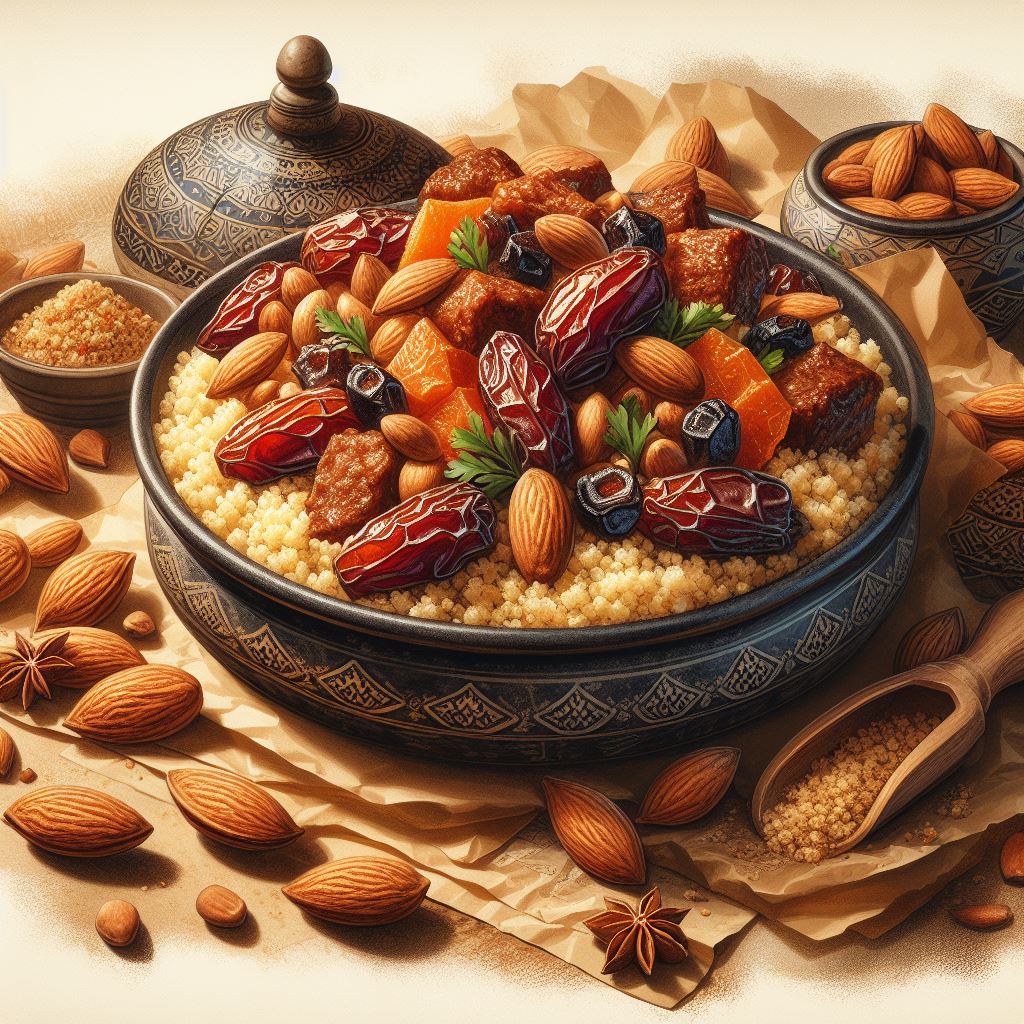Da’shiar
Da’shiar, roughly translated as “gift of the lamb” in the common tongue is a fiery stew that warms the soul, a rich blend of lamb, dates, almonds, and couscous, spiced with cumin, cinnamon, and saffron. It is a dish of celebration and honor, reserved for special guests and occasions. Prepared in great clay or polished bronze cauldrons, Da’shiar is often served with flatbread, Ma'khamsa and goat yogurt to balance the heat.Three big handful of lean, flavorful lamb of the river, cut into bite-sized pieces Two tablespoons of fragrant and golden palm oil, enough to coat the bottom of a medium-sized pot One onion, in pieces, no bigger than a child's nail Four cloves of garlic, minced, as fine as the sands of the desert Salt from the sea, and black pepper, ground fine, each as much as the weight of three grains of barley Cumin, as earthy and rich as the great river’s soil, as much as two grains of barley A thimble of Cinnamon, warm and inviting, as comforting as the desert's embrace Saffron, as delicate and fragrant as a sandflower, as much as a single grain for barley Four cups of water, freshly drawn from the earth One cup of dried dates, sweet and chewy, as inviting as a lover’s lips A quarter cup of toasted almonds, chopped, a taste of home Two cups of couscous, of the finest grains, from the shores of the great river Two tablespoons of butter, creamy and rich, as indulgent as the desert's sunsets Fresh parsley, chopped finely, for garnish, a vibrant display of life
Excerpt from a culinary handbook, Author unknown
Cultural Significance
Da’shiar is said to have originated from the first settlers of the continent, who brought the recipe with them when they first arrived at the shores of Aran’sha. It’s a dish of remembrance, a last whisper of their journey and ancient beginnings.Serving Da’shiar is a gesture of generosity and respect: it requires time and effort to prepare, and offering it to your guests implies you wish to foster a new friendship or alliance with those you serve. As a guest, one should receive such a gift thankfully, for there is great trust and honor in this. However, not all regions share the same customs and attitudes towards Da’shiar. In some regions, it is customary to offer a spoonful of Da’shiar to a stranger as a sign of peace and goodwill, which is the source of the ancient saying among the southern people “A spoonful of Da’shiar is worth more than a thousand promises.”
In contrast, other regions consider it extremely rude to refuse Da’shiar when it is offered, as it implies an insult to the host’s hospitality and good manners.
Preparation
Da’shiar takes a few hours of careful preparation and cooking, but the result is a feast for the senses. The lamb is first seared in oil until golden and crisp, then gently simmered with onion, garlic, salt, pepper, cumin, cinnamon, and saffron in water, creating a fragrant broth. Towards the end of the cooking, dates and almonds are added to the stew, creating a delicious contrast of sweet and savory, soft and crunchy.The couscous is cooked separately in water and butter, then fluffed with a ladle to make it light and fluffy. The dish is served by spooning the couscous onto a large platter of silver or clay, topping it with the tender lamb and the rich sauce, and sprinkled with fresh parsley for a touch of color.



Comments